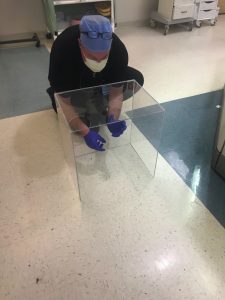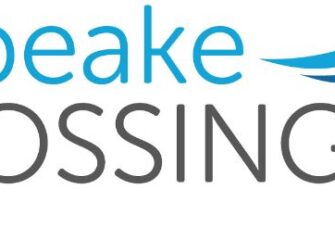
SALISBURY, MD—As Eastern Shore medical systems brace for a possible influx of cases of the novel coronavirus (COVID-19), experts are working to compile equipment they expect to need during the pandemic.
As the respiratory illness forces many patients with severe symptoms onto ventilators, hospitals are looking to protect their staff during the intubation process.
Bill Wolff, assistant professor of sculpture at Salisbury University, working with M4 Reactor in Salisbury, and SU sculpture technician Joshua Killen is creating intubation cubes for Peninsula Regional Medical Center (PRMC).
PRMC supplied a prototype, and M4 Reactor cut out the pieces for 20 acrylic cubes. The Sculpture area assembled and recently delivered nine cubes in early April. Another 11 were delivered by M4.
“We are all dealing with this pandemic together, and I’m happy that there is something the Art Department and Sculpture area can do to help those on the frontlines,” said Wolff. “We will continue to work with PRMC, M4 Reactor and other medical professionals to help in any way possible.”
Wolff and his team are discussing further projects, including producing cast resin face shields and sanitizable respirators.
Every item can help in times of difficulty, and SU was able to supply one respirator from its Physical Plant, which was going unused.
The 3M Belt-Mounted PAPR Painter’s Kit, a battery-operated respirator, was purchased for SU’s paint shop but was not being used. Seeing a need for this type of equipment Jonathan Cooper, Physical Plant assistant director, suggested donating the item to PRMC, where it was accepted by the medical staff.
Off campus, Ph.D. candidate Robert W. Figliozzi ’11, an adjunct faculty member in the Biological Sciences Department, is heading up a research team at IES Life Sciences, Inc., a biotechnological company in Cambridge, MD, in developing a more advanced test for COVID-19.
COVID-19, like other coronaviruses, works to block signals from the immune system, including proteins in the human interferon family, which help to alert cells on how to fight the illness. When the interferons are disrupted, activated immune cells fail to recognize the virus, leading to an amplified immune response which can leave patients vulnerable to autoimmune-like damage to lung and cardiovascular tissues.
The test Figliozzi and his IES team is developing can determine early on – even before a patient displays symptoms – how their body is reacting and whether they can self-isolate and treat their own symptoms, or whether they are more likely to require hospitalization and more advanced healthcare.
The IES team is working to find hospitals and healthcare partners to assist in applying for grants and funding to move the tests forward.
SU students continue to think of each other in these times, as well. The Men’s and Women’s Rugby Clubs are fundraising for a week to donate to the Student Emergency Fund, which is available to current students who encounter unexpected financial needs due to extenuating circumstances that could cause them to withdraw from the University.
To donate to the clubs’ efforts, visit https://giving.salisbury.edu/campaigns/mens-rugby-for-the-student-emergency-fund.
Are you or someone you know a member of the SU community who is helping in the battle against COVID-19? Send a message to Tim Brennan, assistant director of public relations, at tmbrennan@salisbury.edu with details so we can share their story.



